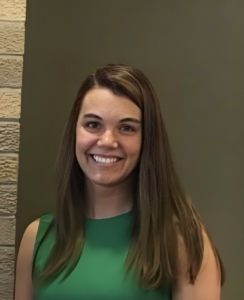Community Advocate Spotlight: Emily Dahl, Bank of Ontario, Westby
 The following is a brief interview between WBA President and CEO Rose Oswald Poels and Bank of Ontario, Westby Executive Vice President and Chief Financial Officer Emily Dahl.
The following is a brief interview between WBA President and CEO Rose Oswald Poels and Bank of Ontario, Westby Executive Vice President and Chief Financial Officer Emily Dahl.
Rose: How did you first get into the banking industry?
Emily: After graduation from the University of Wisconsin – La Crosse with a degree in political science and history, I was looking for a temporary job. I was hired at Bank of Ontario as part of the internal auditing department.
It was important to our president that I also learned how to teller. I’m so thankful for the roles I started in; these duties gave me an understanding of operations, the front line, and loan files. It was the ideal foundation for a career in banking. What I thought was a temporary job started to become more of a career as I took on additional duties and responsibilities as the bank secrecy act (BSA) officer and regulatory compliance officer. As the bank evolved, I became responsible for the call report, ALM, information technology and security, and leading the safety and soundness exam preparation and was promoted to senior vice president. 2023 marks 12 years at Bank of Ontario, where I now serve as the chief financial officer (CFO) and executive vice president (EVP).
What is your favorite aspect of your role at your bank?
Like all community bankers, I wear many hats. I love that I am involved in so many different aspects of the bank. My passion though is asset liability management and liquidity. Many of my duties at the bank are in the background, but I love my role and being a resource for our employees. Whether it’s a regulation, accounting question, or helping them troubleshoot an issue with their email, I enjoy being the go-to person that keeps our bank thriving.
What do you wish the general public understood about the banking industry?
Community banks — like Bank of Ontario — want our customers to prosper. We want the members of our community and the businesses in our community to be successful. Community banks want to create a place where people choose to live, work, and raise their families. Every day, we strive to contribute to an environment that makes this possible. Daily, we invest in individuals, local businesses, and farmers to make our communities strong. We want people to know our banks are a place they can trust and count on, always.
Where do you believe the industry’s greatest challenges are in the next three to five years?
First, we need to continually remain competitive with the products and services we offer. We need to be open and ready for change, specifically when it comes to how people want to bank and access their money. Banks must be able to move forward with the technology that our customers want. From an organizational standpoint, banks, like many other companies, need to be open to new ideas to not only attract new talent, but also retain the talent we have. A community bank is nothing without dedicated employees. The market and regulatory environment will always present challenges and we need to have the right people to navigate those challenges at our banks.
Please describe your current role at your bank and share with us one of your more rewarding experiences.
I serve the bank in many different capacities as CFO, EVP. In addition to that role, I also serve as the BSA officer, as a member of the IS/IT committee, ALCO committee, asset quality and loan committee, compliance committee, and as the Board of Director’s secretary.
While the majority of my roles at the bank do not give me much face-to-face time with our customers, and most of my duties — like the call report and exam and audit preparation — are behind the scenes, I honestly have so many amazing memories.
However, a few years ago, I was given the task of implementing the Paycheck Protection Program (PPP) at the bank. At the time, the bank was not an SBA lender, and this required additional set-up on the bank’s part.
I worked with our lenders and customers on PPP applications, gathering documentation and tracking data, and then eventually applying for forgiveness. Acting in this role allowed me to work one-on-one with our business customers to help provide much-needed relief and payroll funds for their employees in the incredibly difficult time of COVID-19 shutdowns.








